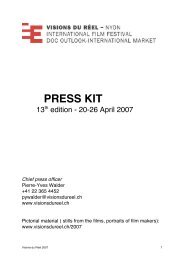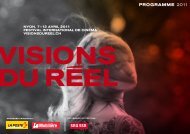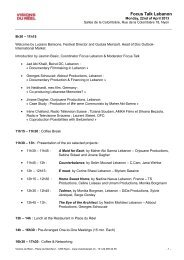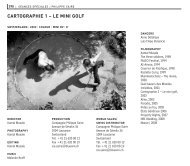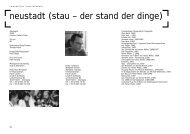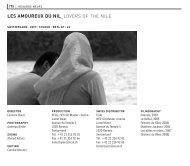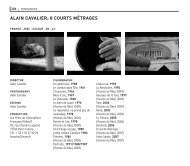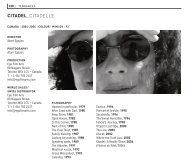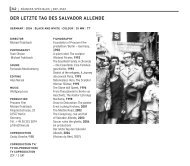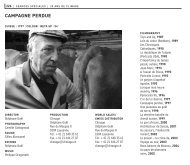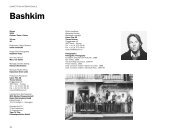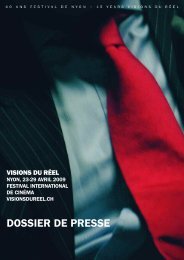Katalog 2013.pdf - Visions du Réel
Katalog 2013.pdf - Visions du Réel
Katalog 2013.pdf - Visions du Réel
Create successful ePaper yourself
Turn your PDF publications into a flip-book with our unique Google optimized e-Paper software.
helvétiques<br />
107<br />
Caroline Cuénod<br />
Des yeux<br />
partout<br />
Switzerland | 2013 | 47’ | HD | English, French<br />
Eyes Everywhere<br />
World Premiere<br />
Clarisse a une obsession : les caméras<br />
de surveillance qui envahissent l’espace<br />
public dans l’indifférence générale.<br />
De Genève à Monaco, en passant par<br />
la Grande-Bretagne, elle accepte non<br />
sans peine de se laisser filmer dans sa<br />
croisade solitaire. Une troublante fiction<br />
<strong>du</strong> réel.<br />
« J’ai toujours voulu faire un film sur<br />
la ville filmée, nourri par les principes<br />
de base de la société de contrôle, tels<br />
que je les ai rencontrés au cours de<br />
mes études sur la prison panoptique<br />
de Bentham, et de son système de<br />
surveillance invisible et intégré par les<br />
hommes. Je pense qu’on a négocié<br />
avec trop d’indifférence notre anonymat<br />
contre notre sécurité. Mais comment<br />
poser cette question dans un film Avec<br />
le personnage de Clarisse, j’ai trouvé<br />
une manière qui me plaisait de pointer<br />
<strong>du</strong> doigt cette problématique : mettre en<br />
lumière la vidéosurveillance au travers<br />
de la révolte de Clarisse, et mettre en<br />
scène l’acceptation d’être filmé lors d’interactions<br />
entre elle et le caméraman.<br />
N’est-ce pas la même question d’acceptation<br />
qui se pose lorsqu’on est filmé<br />
dans son quotidien par les caméras de<br />
la ville » (CC)<br />
Clarisse ist von etwas besessen: von den<br />
Überwachungskameras, die den öffentlichen<br />
Raum unter allgemeiner Gleichgültigkeit<br />
eingenommen haben. Von<br />
Genf bis Monaco über Grossbritannien<br />
lässt sie sich nicht ohne einen gewissen<br />
Widerwillen auf ihrem einsamen Kreuzzug<br />
filmen. Eine verstörende Fiktion der<br />
Wirklichkeit.<br />
«Ich wollte schon immer einen Film über<br />
die gefilmte Stadt machen, genährt von<br />
den Prinzipien der Kontrollgesellschaft,<br />
wie ich sie bei meinen Studien des<br />
Bentham’schen Panoptikum-Gefängnisses<br />
mit seinem unsichtbaren, von<br />
den Menschen verinnerlichten Überwachungssystem<br />
kennengelernt habe. Ich<br />
finde, dass wir im Austausch für Sicherheit<br />
unsere Anonymität zu leicht preisgegeben<br />
haben. Doch wie kann diese<br />
Frage in einem Film gestellt werden Mit<br />
Clarisse habe ich eine Figur gefunden,<br />
mit der ich auf diese Problematik aufmerksam<br />
machen kann: Auf der einen<br />
Seite wird <strong>du</strong>rch ihre Revolte die Videoüberwachung<br />
gezeigt, auf der anderen,<br />
im Austausch mit dem Kameramann, ihre<br />
Einwilligung, gefilmt zu werden. Stellt<br />
sich die Frage der Einwilligung nicht<br />
ebenfalls, wenn man tagtäglich von den<br />
Kameras der Stadt gefilmt wird» (CC)<br />
Clarisse has an obsession with something<br />
most people generally disregard:<br />
the CCTV cameras which have invaded<br />
our public spaces. From Geneva<br />
to Monaco to the UK, she reluctantly<br />
agrees to allow herself to be filmed <strong>du</strong>ring<br />
her solitary journey. The result is an<br />
unsettling mélange of fiction and documentary<br />
filmmaking.<br />
“I always wanted to make a movie on<br />
CCTV. I wanted this film to be fed by the<br />
basic principles of the society of control,<br />
such that I met <strong>du</strong>ring my studies on the<br />
Panopticon of Jeremy Bentham, and its<br />
invisible monitoring system integrated<br />
by men. I think we have negotiated with<br />
too much indifference our anonymity<br />
against our security. But how to ask this<br />
question in a movie With the character<br />
of Clarissa, I found a way that I liked to<br />
point this problem: I could highlight the<br />
CCTV topic through Clarissa’s revolt, and<br />
stage the acceptance of being filmed<br />
with interactions between her and the<br />
cameraman. But is not this the same<br />
issue of acceptance which arises when<br />
one is shot in one’s daily life by the cameras<br />
of the city” (CC)<br />
Alessia Bottani<br />
Cinematography<br />
Gabriel Lobos<br />
Sound<br />
Jürg Lempen<br />
Editing<br />
Thomas Schunke<br />
Music<br />
Nicolas Rabaeus,<br />
Gregorio Zanon<br />
Pro<strong>du</strong>ction<br />
Isabelle Gattiker (ECAL)<br />
Filmography<br />
2013 Des yeux partout (mlf)<br />
2011 A Way from the G.R.A. (sf)<br />
2010 Pièces à rêverie et autres<br />
convictions (sf)<br />
2010 Archives confiées (mlf)<br />
2010 La cage (sf)<br />
2010 L’art et le non-art (sf)<br />
2008 Bellevue (sf)<br />
2006 Le panoptique, une prison<br />
modèle (sf)<br />
Contact<br />
Master cinéma HES-SO ECAL / HEAD<br />
Isabelle Gattiker<br />
+41 213169203<br />
isabelle.gattiker@ecal.ch<br />
Jean Guillaume Sonnier<br />
jean_guillaume.sonnier@ecal.ch<br />
www.ecal.ch



